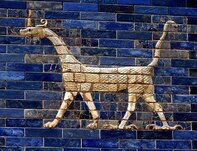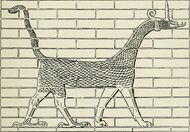I’ve been researching Sumerian mythology for an upcoming submission.
My story features the lion-dragon mušḫuššu or Mush-kush-shu. The lion-dragon was one of eleven hybrid supernatural races created by the goddess Tiamat to vanquish the upstart gods who killed her husband.
My story features the lion-dragon mušḫuššu or Mush-kush-shu. The lion-dragon was one of eleven hybrid supernatural races created by the goddess Tiamat to vanquish the upstart gods who killed her husband.
| Mush-kush-shu was a scaled animal with the taloned hind legs of an eagle, and the chest and front legs of a lion. They were shaped like a dragon-headed horse with a whip-tail and no wings. Two sets of horns crowned their head: a curled set arcing behind their skull and two sharp spikes on their snout. |
In later mythology of the war god Marduk’s cult, Mush-kush-shu helped Marduk (or Marutuk) defeat Tiamat.
By around 620 BCE, Mush-kush-shu was touted as Marduk’s servant and sacred animal.
It seems unlikely that a noble lion-dragon would willingly defy their creator/mother Tiamat and kill their own siblings (the ten other supernatural races Tiamat birthed) to advance a lesser god.
In my story, I explore how Mush-kush-shu might have felt about having their identity appropriated by a later war god's cult.
All myths are in a sense propaganda used by competing sects to advance their own agendas.
The ruling elite of ancient Mesopotamia promoted Marduk to justify (and divinely assist) their imperial conquests.
That the cult of Marduk stressed that god’s defeat of Tiamat and the subjugation of her most powerful offspring speaks more to the enduring power of Tiamat and her brood than the actual popularity of the Mesopotamian war god.
By around 620 BCE, Mush-kush-shu was touted as Marduk’s servant and sacred animal.
It seems unlikely that a noble lion-dragon would willingly defy their creator/mother Tiamat and kill their own siblings (the ten other supernatural races Tiamat birthed) to advance a lesser god.
In my story, I explore how Mush-kush-shu might have felt about having their identity appropriated by a later war god's cult.
All myths are in a sense propaganda used by competing sects to advance their own agendas.
The ruling elite of ancient Mesopotamia promoted Marduk to justify (and divinely assist) their imperial conquests.
That the cult of Marduk stressed that god’s defeat of Tiamat and the subjugation of her most powerful offspring speaks more to the enduring power of Tiamat and her brood than the actual popularity of the Mesopotamian war god.




 RSS Feed
RSS Feed